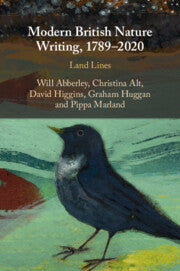Modern British Nature Writing, 1789–2020 : Land Lines
- Unit price
- / per
-
Author:ABBERLEY Will / ALT Christina
-
ISBN:9781316641897
-
Publication Date:February 2025
-
Edition:1
-
Pages:284
-
Binding:Paperback
-
Publisher:Cambridge University Press
-
Country of Publication:United Kingdom


A Back Order button means that we don’t have the book in stock at our store. It may already be on order – or we can order it for you from a publisher or distributor at no additional cost.
As we source items from around the globe, a back-order can take anywhere from 5 days to several weeks to arrive, depending on the title.
To check how long this might take, you’re welcome to contact us and we can provide an ETA or any other information you need. We recommend checking the timeframe before committing to an online order.
Modern British Nature Writing, 1789–2020 : Land Lines
- Unit price
- / per
-
Author:ABBERLEY Will / ALT Christina
-
ISBN:9781316641897
-
Publication Date:February 2025
-
Edition:1
-
Pages:284
-
Binding:Paperback
-
Publisher:Cambridge University Press
-
Country of Publication:United Kingdom
Description
Why do we speak so much of nature today when there is so little of it left?
Prompted by this question, this study offers the first full-length exploration of modern British nature writing, from the late eighteenth century to the present. Focusing on non-fictional prose writing, the book supplies new readings of classic texts by Romantic, Victorian and Contemporary authors, situating these within the context of an enduringly popular genre. Nature writing is still widely considered fundamentally celebratory or escapist, yet it is also very much in tune with the conflicts of a natural world under threat. The book's five authors connect these conflicts to the triple historical crisis of the environment; of representation; and of modern dissociated sensibility.
This book offers an informed critical approach to modern British nature writing for specialist readers, as well as a valuable guide for general readers concerned by an increasingly diminished natural world.
Adding product to your cart
You may also like
A Back Order button means that we don’t have the book in stock at our store. It may already be on order – or we can order it for you from a publisher or distributor at no additional cost.
As we source items from around the globe, a back-order can take anywhere from 5 days to several weeks to arrive, depending on the title.
To check how long this might take, you’re welcome to contact us and we can provide an ETA or any other information you need. We recommend checking the timeframe before committing to an online order.
You may also like
You may also like
-
Why do we speak so much of nature today when there is so little of it left?
Prompted by this question, this study offers the first full-length exploration of modern British nature writing, from the late eighteenth century to the present. Focusing on non-fictional prose writing, the book supplies new readings of classic texts by Romantic, Victorian and Contemporary authors, situating these within the context of an enduringly popular genre. Nature writing is still widely considered fundamentally celebratory or escapist, yet it is also very much in tune with the conflicts of a natural world under threat. The book's five authors connect these conflicts to the triple historical crisis of the environment; of representation; and of modern dissociated sensibility.
This book offers an informed critical approach to modern British nature writing for specialist readers, as well as a valuable guide for general readers concerned by an increasingly diminished natural world.
-
-
Author: ABBERLEY Will / ALT ChristinaISBN: 9781316641897Publication Date: February 2025Edition: 1Pages: 284Binding: PaperbackPublisher: Cambridge University PressCountry of Publication: United Kingdom
Why do we speak so much of nature today when there is so little of it left?
Prompted by this question, this study offers the first full-length exploration of modern British nature writing, from the late eighteenth century to the present. Focusing on non-fictional prose writing, the book supplies new readings of classic texts by Romantic, Victorian and Contemporary authors, situating these within the context of an enduringly popular genre. Nature writing is still widely considered fundamentally celebratory or escapist, yet it is also very much in tune with the conflicts of a natural world under threat. The book's five authors connect these conflicts to the triple historical crisis of the environment; of representation; and of modern dissociated sensibility.
This book offers an informed critical approach to modern British nature writing for specialist readers, as well as a valuable guide for general readers concerned by an increasingly diminished natural world.
-
Author: ABBERLEY Will / ALT ChristinaISBN: 9781316641897Publication Date: February 2025Edition: 1Pages: 284Binding: PaperbackPublisher: Cambridge University PressCountry of Publication: United Kingdom
-



